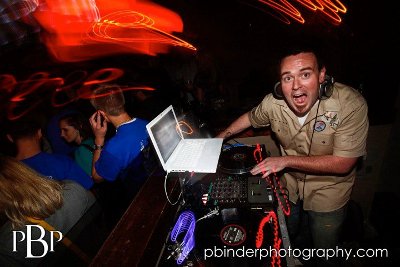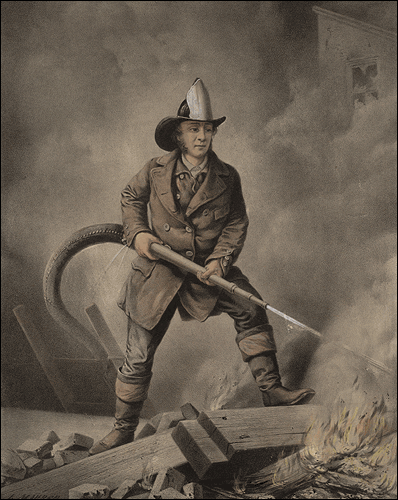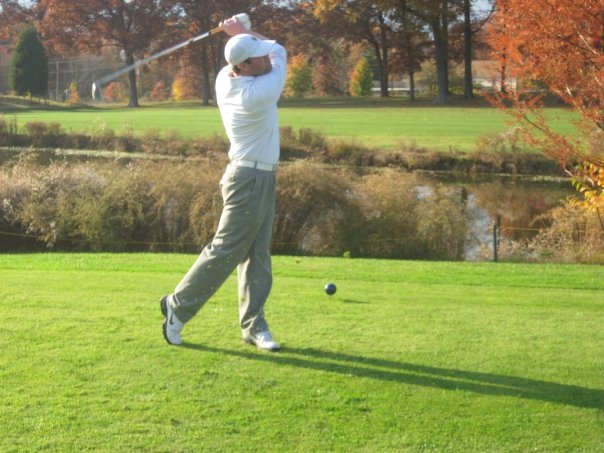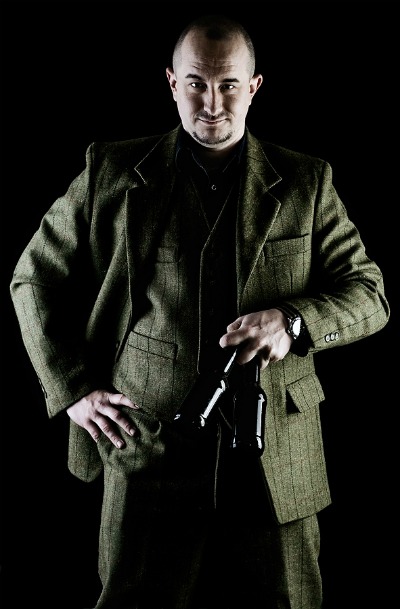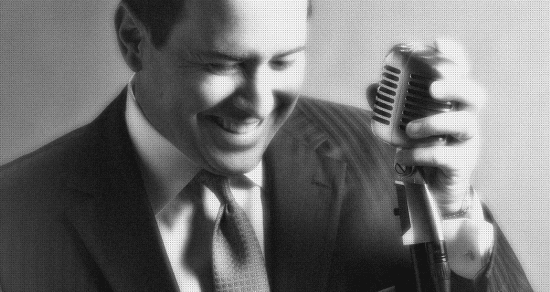
Once again we return to our So You Want My Job series, in which we interview men who are employed in desirable jobs and ask them about the reality of their work and for advice on how men can live their dream.
It’s crowded, but not boisterous in the hotel’s lounge. Everyone has a cocktail in their hand, and is engaged in quiet conversation, or perhaps just silently enjoying the evening. Setting the mood is an old-school crooner; a gentleman all dressed up, and filling the room with his witty banter and warm, jazzy singing. It’s a classy and romantic environment, helped in large part by the charismatic guy on stage.
Is the year 1955, the singer Frank Sinatra? No, it’s 2015, and the crooner is Wade Tower. Based out of Oklahoma, Tower brings back the pleasures of Rat Pack-era standards (as well as classic country western tunes) to modern audiences. We had the pleasure of interviewing Mr. Tower about what his ring-a-ding-ding job entails.
1. Tell us a little about yourself (Where are you from? How old are you? Describe your job and how long you’ve been at it, etc.).
I grew up in Oklahoma. Years ago I lived briefly in L.A., but I wanted to raise my family in Oklahoma so I have been here most of my life. I love Oklahoma for a lot of reasons, but mainly there are two that stand out. Being right in the center of the country makes traveling fairly easy. I love what I do, but hate being away from my family, so getting to places, and back, quickly is important to me. Also, I love the people here. You never meet a stranger.
I am 50.
Being a crooner is simply being an entertainer. The term “crooner” is an epithet given to male singers of jazz standards. But, ironically, Sinatra said in an interview he did not consider himself or Bing Crosby crooners. Over the years crooning has crossed over into other genres. Bing Crosby had some huge country hits and brought “crooning” into country music and Dean Martin’s country music during his time with Reprise are classics.
Growing up in Oklahoma I love doing both — standards and country — which are the most popular genres for crooning. I have shows that highlight each of them; I have a standards show called “The Chairman and Friends” that is a tribute show to Sinatra. I also do a show called “Damn Strait” that is a tribute show to George Strait.
That being said, I perform my shows for events and venues of all kinds. One week might include singing for a private event with my big band during a cocktail hour at a charity event, performing the Sinatra show for a corporate event, and then headlining at a casino with the Strait show.
I think most people think of crooners singing in a smoky lounge while people sit around and drown their sorrows. I have done plenty of that. Lounge work is good work because it is steady, and a contract with a hotel or lounge is usually 3 months to a year in length. In this business, as with all, consistency is a blessing and it gives you a chance to work on your craft. Singing for 3 hours a night once a week with no set outline gives you an opportunity to try out new material and see what works and what doesn’t.
That is what I love about what I do. Every crowd is different and every venue is different. It’s funny, they are the same in a lot of ways, but it’s the people that make each place unique. When you love being in front of people it doesn’t really matter what that looks like — you just need somebody else in the room.
2. Why did you want to become a crooner? Did you always know you wanted to sing for a living?
I grew up watching old movies. I always had this love of the 40s where people dressed well and seemed to have much better manners than they do today. There was a feeling of formality to life then and a sense gratitude that rang true to me. My first “icon” of sorts was Bing Crosby. He had that voice and a sense of humor that made him a star, but also likeable. As I listened to his music, that led to Sinatra, Martin, Bennett and all of the other great crooners. I was hooked.
I first performed at church when I was four. I had the bug from the day I was born. As my brother says, “If you turn on a flashlight Wade will jump in front of it and start singing.” True. I’ll admit it. I love performing. I grew up wanting to entertain. Singing just sort of rose to the top because it allows me to use all of the skills I have in one format. Doing a show involves singing well, but you also have to make sure the crowd stays engaged and enjoys themselves. Being at a live show is about the total experience and not just the songs themselves.
3. How do you become a crooner? Did you study music in school?
As I mentioned, I have always performed. I have always loved standards and the crooners from country music, but I never understood how much others loved the music too until I sang at a charitable event where they had local “celebrities” do karaoke. I was not performing full-time back then and I quite honestly had put off preparing for the event. I chose Sinatra’s “That’s Life” the day before the show and when I walked on stage it just clicked. I had on a tuxedo, lit a cigarette when I walked on stage, and after I sang I got a standing ovation. As I walked to my car that night I realized that something inside of me had just happened. The connection with the audience that night was addictive.
I took my first voice lessons when I was in the fifth grade. I continued to participate in every type of class and instruction I could growing up. I was blessed to have parents who supported my passion and allowed me to be in plays and acting classes my entire life. I attended college as a theater major on a scholarship. Again, singing was always a part of my life, but I didn’t focus on it until later in life. I have taken private voice lessons on and off the last 15 years to keep me in shape vocally and make sure I remember to sing technically correct.
4. What does an average day entail for you? What does being a crooner actually look like?
Since I still have a day job, my average day is a lot like everyone else’s. I work my day job, spend some time with my family at dinner and in the early evening, and then later at night I work on new songs, develop bits for my shows, or email people about bookings. I drive a lot in my day job so I listen to music in my truck constantly. When I am not in my truck I have music playing in my office. I love music, and I have to listen to it so I can learn new songs or find new songs to perform. Music has always been a constant in my life, but the soundtrack of my days are very eclectic. I may listen to a bunch of big band and jazz songs in the morning and spend the afternoon listening to both classic and new country.
On show days my life looks more like you would expect a crooner’s life to look. Most show days start slow and build to a crescendo. I try and wake up late compared to most days, around 8:00 or 9:00, get in a run, and have some breakfast. Then I simply hang out in my hotel room or a coffee shop nearby. You want to make sure you don’t walk on stage tired or worn out so I don’t sightsee much when I travel. I will go to a sound check mid-afternoon with the band. We usually complete the sound check and a short rehearsal in about 90 minutes depending on the venue. After sound check I will go back to my hotel room and try to catch a quick nap if I can, which I usually can’t. I will eat early because I don’t like to perform on a full stomach. If show time is 8:00 I will eat around 4:00. After an early dinner I hang out again, and then will head to the dressing room around 6:30 to get dressed and make sure everything is set for the show. Shows can run an hour or two depending on the event and once we are done we will usually find someplace to grab a bite before we head off to the hotel room and call it a day. It is difficult to wind down after a show. The energy the crowd gives you doesn’t wear off for a while.
5. How do you find work as a crooner? Can it be a full-time living, or is just something to do on nights/weekends? Do you have an agent?
Chasing work can be the biggest obstacle. It is difficult when you start out because no one knows who you are or how good you are at what you do. Once you can get some work under your belt it does get easier. The problem with being a crooner is that I sing a specific type of music. I am not a cover band. I am not a dance band per se. People don’t hire me and get a huge variety of music. They have to want to hear the jazz standards or country music from George Strait and similar. But, I love crooning because they are songs people are familiar with. They are songs that people love and have very concrete memories with. Honestly, I have not met a crowd yet that didn’t love the music. Whether they like me or not is one thing, but the songs are always popular.
It can certainly be a full-time living, but you have to be willing to travel almost every week. I have a day job, but I have been working towards making it full-time for the last few years and my hope is that it will happen in 2016. Going full-time is a big step, especially with a family, so you want to make sure your calendar is booked for at least a year out before you take that leap.
I do have a booking agent, About-Entertainment in Los Angeles. I have also worked with Box Talent in Oklahoma City for several years. They handle all of the paperwork and the contract side of the business and I am eternally grateful for that partnership. I do not have a manager at the moment. I have had a few in the past, but it is difficult to find someone who believes in your abilities and as importantly, has the power to give your career some momentum.
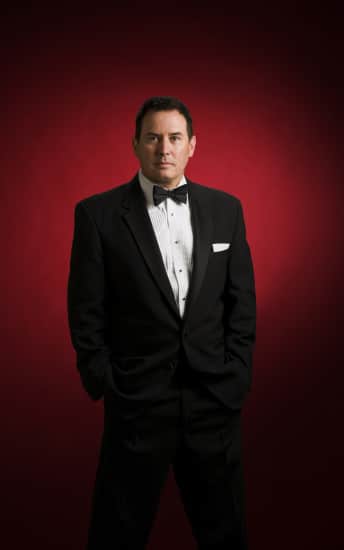
6. What’s the job market like? What would you say to a young person who wants to get into the biz?
The “job” market is wide open if you are willing to be creative. My shows will fit into many different types of events and venues, but people don’t always have the vision to see that fact. You have to build relationships and then work with people to help show them how having a crooner can positively affect the success of their venue and/or their event. There is a huge misconception that the standards side of crooning only appeals to people over 60. But, I sing at a lot of private events and shows where the audience age range is 20-40 and they have a blast. Michael Buble has a had a lot to do with making the music known to younger people, but I hear story after story about folks who have heard these songs at their grandparent’s homes or that it is the music their parents listened to often. Sinatra and Strait are two legends in the crooning/music business and I find people all over the country who love their music.
I created two bands, one big band for the standards and one country band for the Damn Strait shows. If you are starting out and really want to work you will need to find some musicians who are better than you are and build relationships with them. My musicians are amazing and I literally could not do what I do without them. I would love to say people hire me for me, but the reality is if your band is average you will be average too, no matter how well you sing. I would put my two bands up against anyone’s, anywhere. Any success I have is on their shoulders and they definitely make me better.
I would certainly encourage someone who is passionate about this business. But, be smart about it. I don’t want to sound like a father, but get an education. Make sure you can support yourself with another skill or profession. Crooning can open a lot of doors and provide some amazing opportunities. I read a book by Jon Acuff, Quitter, years ago and he touched on that same principal — chase your dreams, but do it in a way that gives you the best opportunity to succeed. As I said above, I work with a lot of incredible musicians who teach music and give private lessons or have built financial support with other careers. One of my pianists is a retired airline pilot. You have to be realistic that crooning is a niche market and that to make a living you may have to do something along with singing.
If you are meant to sing professionally full-time it will happen. I love that about show business; the audience will tell you if what you are doing is working. You never have to wonder long if what you do is well-received.
7. What is the work/life balance like?
I have a wife and three daughters and I would rather spend time with them than anything else on the planet. Yes, I have to travel a lot, and yes, it is somewhat all-consuming when I am preparing for a show, but my down time is totally mine. I am not on call and I have no responsibilities when I am not working.
That freedom is a double-edged sword; I am my own boss and make my own hours show business-wise, but if I am not singing I am not making any money. So you do have to balance how much to work and to schedule and when to take a break.
The ups and downs of show business can be brutal. I had an incredible 2010-2012, but then I learned some painful lessons in 2012 and 2013. I made some mistakes and managed the business side of my world horribly. That is the reason I still have a day job. I had to back up, take stock of what was working and what wasn’t, and start over.
My busiest year, I believe I did around 100 dates. Break that down into 52 weeks in a year and I averaged a little over 2 shows a week. That doesn’t sound like much, but add a travel day to each of those dates and it becomes a chore. Also, you obviously don’t work a consistent two shows a week. Some months you may work twice and then some months you may have fifteen shows. Honestly, those busy months are what I work so hard for and I love them. When you live to be in front of people, any chance to be in front of people is a blessing. Plus, work is always a blessing.
I know, from my own experience, there are worse ways to make a living. To do something I love and get paid for it? It seems like a dream at times.
8. What’s the best part of your job?
Being on stage. Period. Being in front of an audience and working to gain their trust and help them relax for a while is an incredible feeling. Life is hard. The world can be cruel to people and I know most people work way too hard for what they get paid. If I get an opportunity to make their life better, even if just for an hour or two, I feel like that is a huge opportunity. I am grateful for each and every person who spends some of their hard-earned money and their precious time to come and watch me do what I love.
I love seeing people smile as I sing and hearing them laugh as I tell them some of the stories about my life. I love talking to them after the shows and hearing how a certain song has impacted their life. I love having the chance to share life with people. I am very transparent on stage and in life. I feel like we go through things to help others know how to deal with similar situations. The only way to share your experiences is to step into each other’s lives. Being in this business allows me the chance to get to know a lot of people. I hope that time on stage is the beginning of a relationship with each audience member. In this day of social media they can continue to follow and interact with me long after that one show. I love people and I love getting to hear their stories. I have gotten to share in some huge moments in people’s lives, good and bad, all because we met at a show. Those relationships mean more to me than anything; music is great, but people matter most. The music is simply a tool to help bring us together.
9. What’s the worst part of your job?
It is easily the business side of showbiz. I love the hard work involved in creating shows, rehearsing, and being on stage. As I mentioned, I am not crazy about the travel, but I absolutely hate chasing down show dates, putting together contracts, and making sure paperwork is complete for each show along the way. I am little OCD about things that deal with the show itself and I worry about every tiny detail. But I do not have the skills or passion to spend time on the business details. My dad was a successful businessman and I would love to be better at it, but I don’t have the patience and/or the skill set necessary. The details and hard work that go into each performance have a direct impact on the audience and their enjoyment. I know paperwork has an impact on my business, but I have a really hard time connecting paperwork to an audience.
Again, to be successful in this business you have to surround yourself with people who are better than you are at certain things. Since I hate the paperwork side, my booking agencies deal with that side of the business. Delegation makes life so much easier.
10. What’s the biggest misconception people have about your job?
People think that crooners are these lounge singers that sleep until noon each day and live their lives when the sun goes down. I run into people all of the time that imagine I live in Vegas or New York City and assume I have a party lifestyle.
I love the atmosphere of a nice hotel lounge and I love casinos, but I don’t drink and you’ll find me at church every Sunday. It’s a little bit ironic — although I love the vibe of those places I am not one who would probably be there if I wasn’t performing. I’m not a gambler, I just love the energy of those places.
Plus, I enjoy watching people getting to relax. They come to these places to unwind and forget about their cares for a while and I have a front row seat. People will ask me during a set or after a show if I get any time off, but they don’t realize to me being on stage is time off. It’s a win/win — they can have a beer and decompress and I can relax while singing to them.
11. Any other advice, tips, commentary, or anecdotes you’d like to add?
I would suggest to anyone, simply do what you love. Crooning for a living has not been easy. There have been some rough times, financially and emotionally, but I can tell my girls and my future grandkids that I always did what I thought I was made to do in this world. I try to have a positive impact on everyone I have the privilege of meeting along the way. I am 50 and I have had people say I am too old to still be chasing this dream, but it’s not a dream if you are living it.
Lastly, be kind to people. Be nicer than you have to be to everyone. Make sure everyone you meet along the way knows you care about them and do what you can to encourage them. I love crooning because the music is happy music. I don’t believe anyone can listen to big band music or George Strait music and not tap their toe and start moving a little to the music. Great music can change your mood, change your day, and in my personal experience, it has changed my life.
Tags: So You Want My Job


